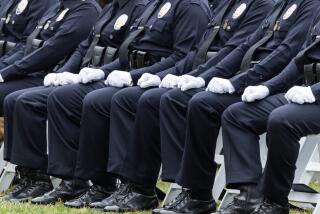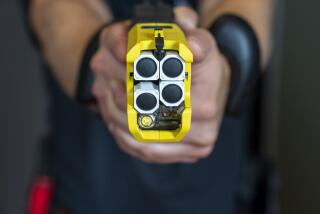Unions Vow Court Fight : Boston Police to Undergo Drug Testing
BOSTON — All 2,400 employees of the Police Department will have to undergo random drug testing starting in June, Police Commissioner Francis Roache announced Thursday, saying Boston deserves a drug-free force.
The testing procedure, using state-of-the-art scientific equipment, would be more sophisticated than that used in any other U.S. city and would safeguard the legal rights of the uniformed and civilian workers, Roache said.
Unions representing the police employees immediately vowed to challenge the action in court as a violation of the constitutional right against improper searches.
Agrees to Delay
Roache agreed to wait until June 21 to begin the testing in hopes of getting a Superior Court opinion on the legality of the procedure.
“This rule is necessary to assure the citizens of Boston that our police officers are drug-free. The members of the department must be prepared to deal with life-threatening situations every day,” the commissioner said.
“Our unique drug-testing regulation will ensure that officers and the citizens they serve will be protected from the drug problems plaguing our society,” he said.
The program calls for urine tests of all police employees at least once a year for the presence of marijuana, cocaine, heroin and “angel dust.”
The urine will be divided into six samples, with four used to test for each of the drugs. The city will spend up to $25 per employee for the initial tests, which will use gas-chromatography and other sophisticated equipment that can detect minute levels of a drug.
Can Use Outside Expert
Any positive finding will prompt a re-test for the substance in the fifth sample. If that test is positive, the officer will be able to bring in an expert to conduct an independent test on the final sample.
In addition to random testing, any police employee suspected of using narcotics can be forced to submit to a test. Employees who test positive would be subject to a full range of disciplinary action, including dismissal.
Roache said he didn’t think the department had any more drug users than other urban police departments or the general population. But he said he decided to act after many officers urged him to do so over the past year.
Gerald Arenberg, executive director of the American Federation of Police, said the Boston action paralleled similar efforts throughout the country.
Michael Powers, counsel to the Boston Police Department, said he studied similar programs tried by other police departments, the military and private businesses before drafting the Boston plan. He said he hoped the city’s regulation could serve as a model that could be applied elsewhere.
Robert Guiney, who heads the 1,400-member Boston Police Patrolmen’s Assn., said the union would immediately challenge the proposal in court.
“We’ve said all along there’s no place for drugs in police work, but we are not going to give up our Fourth Amendment right,” Guiney said. “We’ll fight it all the way. If we have to go to the Supreme Court, we’ll go.”
More to Read
Sign up for Essential California
The most important California stories and recommendations in your inbox every morning.
You may occasionally receive promotional content from the Los Angeles Times.










